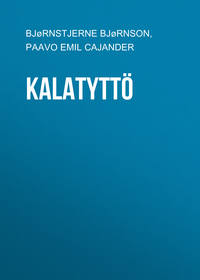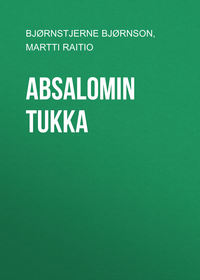 полная версия
полная версияMagnhild; Dust
When she sailed from Liverpool she was sitting forward on the gunwale of the large ship. A gentleman came up to her and in broken Norwegian claimed acquaintance with her, for just as she was sitting now, he said, she had sat a month before on the back of his cariole. Rönnaug, too, remembered him, and they talked together that day and many other days. After a while he brought a lady with him. The next day he and the lady came again and invited Rönnaug to go with them to the first cabin. Here the lady and she, with the aid of the gentleman, entered into an English conversation, which created much amusement. Others soon gathered about the group and the upshot of it all was that Rönnaug was compelled to remain in the first cabin, she really did not know at whose expense. She took a bath, was provided with new clothes from top to toe, several ladies contributing, and remained as a guest among the passengers. All were kind to her.
She left the ship with the lady, who proved to be an aunt of the gentleman who had first spoken to Rönnaug and at whose expense, as she soon learned, she had traveled. He afterwards had her provided with instruction and the handsomest support, and it was at his expense they all three took frequent long journeys together. For the past two years she had been his wife, and they had a child about a year old whom she had with her. And this child Magnhild must see – not "to-morrow," nor "by and by," but "now," "right away!"
Magnhild was not dressed. Well, then she must speedily make her toilet. Rönnaug would help her – and in spite of all resistance they were both soon standing in Magnhild's chamber.
As soon as Magnhild had begun to dress Rönnaug wandered about in the rooms. As she did so she asked one single question, and this was: why Magnhild was not dressed so late in the day. A long protracted "oh!" was the only answer she received. Rönnaug hummed softly to herself as she went out into the front room. By and by some words were uttered by her; they were English words, and one of them Magnhild heard distinctly: it was "disappointed." Magnhild understood English; during the past three winters Skarlie had read the language with her, and she could already read aloud to him from the American weekly paper, which, since his sojourn in America, it had been a necessity for him to take. She knew, therefore, that "disappointed" was the same as "skuffet."
There are times when a change occurs in our mood, inasmuch as the sun which filled the whole room suddenly disappears, leaving the atmosphere gray, cold, within and without. In like manner Magnhild was involuntarily seized with an indescribable dread; and sure enough, the next time Rönnaug came humming past the open door (she was looking at the pictures on the wall), she cast a brief side glance in at Magnhild; it was by no means unfriendly; but it was felt, nevertheless, by Magnhild, as though she had received a shock. What in all the world had happened? or rather, what was discovered? It was impossible for her to conceive. She cast her eyes searchingly around the room, when she came in after dressing. But she sought in vain for anything which could have betrayed what she herself would have concealed, or indicated what could have caused displeasure. What was it? Rönnaug's face was now quite changed – ah! what was it?
They set forth; both had grown silent. Even on the street, where there must be so much that was familiar, she who had but now spoken in three languages could hold her peace in them all. They met a man in a cariole, who was talking passionately with a younger man he had stopped; both bowed to Magnhild, the elder one with an air of indifference, the younger one with triumph in his pimpled face and flashing eyes. For the first time Rönnaug roused to interest. Although nearly five years had elapsed since she had served as "skyds" girl to the unknown man who had talked about Magnhild's destiny, and who had seen her herself in circumstances of which she was now ashamed, she recognized him at once. Hurriedly grasping Magnhild's hand, she cried: —
"Do you know him? What is his name? Does he live here?"
In her eagerness she quite forgot to use her mother-tongue.
Magnhild replied only to the last question: —
"Yes, since last winter."
"What is his name?"
"Grong."
"Have you had any conversation with him?"
"More with his son; that was he who was standing by the cariole."
Rönnaug looked after Grong, who at this moment drove briskly, it might almost be said angrily, past them.
They soon came to the second hotel on the right hand side; a maid servant was asked if a lady had stopped there with a child. They were shown up-stairs. There stood the lady who had accompanied Rönnaug. The latter asked her in English where the child was, at the same time presenting Miss Roland to Mrs. Skarlie, after which all three went into the adjoining room.
"Ah, we have a cradle!" exclaimed Rönnaug in English, and threw herself on her knees beside the cradle.
Magnhild remained standing, at a little distance. The child was very pretty, so far as Magnhild could see. Rönnaug bent over it and for some time she neither looked up nor spoke. But Magnhild saw that great tears trickled down on the fine coverlet that was spread over the cradle. There arose a painful silence.
Rönnaug rose to her feet at last, and with a side glance at Magnhild she went past her into the front room. Magnhild finally felt constrained to follow her. She found Rönnaug standing by the window. A carriage stopped at that moment in front of the hotel. Magnhild saw that it was drawn by three men. It was a new, handsome traveling carriage, the handsomest she had ever seen.
"Whose carriage is that?" asked she.
"It is mine," replied Rönnaug.
Betsy Roland came in and asked some question. Rönnaug went out with her, and when, directly afterward, she returned to the room, she went straight up to Magnhild, who still sat looking at the carriage. Rönnaug laid one arm about her neck.
"Will you go with me in this carriage through the country, Magnhild?" she asked, in English.
At the first contact Magnhild had become startled; she was conscious of Rönnaug's eyes, of her breath; and Rönnaug's arm encircled her like an iron bar, although there certainly was no pressure.
"Will you go with me through the country in this – in this carriage, Magnhild?" she heard once more, this time in a blending of the dialect of the parish and English, and the voice trembled.
"Yes," whispered Magnhild.
Rönnaug released her, went to the other window, and did not look round again.
"Is the carriage from America?"
"London."
"How much did you give for it?"
"Charles bought it."
"Is your husband with you?"
"Yes – ja," and she added, brokenly, "Not here; Constantinople – delivery of guns – in September we are to meet – Liverpool." And then she looked up at Magnhild with wide open eyes. What did she mean?
Magnhild wished to go. Rönnaug accompanied her down-stairs, and they both went out to inspect the carriage, about which stood a group of people who now fell back somewhat. Rönnaug pointed out to Magnhild how comfortable the carriage was, and while her head was still inside she asked, —
"Your rooms up-stairs, are they to let?"
"No, it would give me too much trouble."
Rönnaug hastily said "good-night," and ran up the steps.
Magnhild had not gone very far before she felt that she certainly ought to have offered those rooms to Rönnaug. Should she turn back? Oh, no.
This was one of Magnhild's wakeful nights. Rönnaug had frightened her. And this journey? Never in the world would she undertake it.
CHAPTER X
When she left her chamber after ten o'clock, the first object she beheld was Rönnaug, who was coming up from the coast town, and was on her way to call on Magnhild – no, not on Magnhild, but on the priest, the young curate, who lived at Magnhild's house, in the former saddler workshop. Rönnaug at the priest's? At eleven o'clock she was still with him. And when she came out, accompanied by the curate, a shy young man, she merely put her head in Magnhild's door, greeted her, and disappeared again with the curate.
Magnhild found still greater cause for wonder, for later in the day she saw Rönnaug in company with Grong. This wounded her, she could scarcely tell why. The following day Rönnaug called in as she passed by; various people were discussed whom it had entertained Rönnaug to meet, but not a word was said about the journey. Several days went by, and it was still not mentioned. Perhaps it had been given up!
But finally Magnhild began to hear about this journey from others: first from the sailor's wife who did the work of her house, then from the woman of whom she bought fish, finally from every one. What should she do? For upon no account would she consent to go.
Rönnaug told her that she was reading Norse with Grong, and also with the curate, in order that neither might have too much torment with her at any one time; she wrote exercises, too, she said, and laughed. In the same abrupt manner she touched upon sundry individuals and circumstances, mentioned them in the most characteristic way, and hurried on to something else. Magnhild was not invited to the hotel. Rönnaug often went by pushing her child in a little wagon she had bought; she would stop and show the child to every one she met, but she never brought it in to see Magnhild.
Rönnaug made the most extraordinary sensation in the town. It was no unusual thing at a sea-port town to see remarkable changes of fortune. Judging from the presents Rönnaug made, indeed from her whole appearance, she must be immensely wealthy, yet she was the most unassuming and sociable of all. Magnhild frequently heard her praises sounded; the young curate alone occasionally observed that she decidedly evinced that impatience which was characteristic of such a child of fortune.
But what then did Rönnaug hear about Magnhild? For it might be assumed beyond all doubt that if she did not question Magnhild herself she at least asked others about her. This was true, but she proceeded very cautiously. There were, indeed, but two people to whom she put direct questions, – the young curate and Grong.
The curate said that during the whole time he had been at the Point, and that was now nearly a year, he had neither heard nor seen anything but good concerning Magnhild. Skarlie was a person who was less transparent; according to universal testimony he had settled in this town merely to study the prevailing conditions and utilize them for his own benefit – "without competition and without control." He was sarcastic and cynical; but the curate could not deny that it was sometimes amusing to talk with him. The curate had never heard that Skarlie was otherwise than considerate to his wife – or rather his adopted daughter; for other relations scarcely existed between them. And the shy young curate seemed quite embarrassed at being obliged to give this information.
Grong, on the contrary, called Magnhild a lazy, selfish, pretentious hussy. She would not even take the trouble to tie up her stockings; he had noticed this himself. The hand-work she had started here had long since been left to a hunchback girl named Marie and a tall girl by the name of Louise. Magnhild occasionally taught them something new, yet even that was due not to herself but to her husband, who picked up such things on his travels and spurred her on to introduce them. Upon the whole, Skarlie was a capable, industrious fellow, who had breathed life into this sleepy, ignorant parish, and even if he had victimized the people somewhat, it could scarcely be expected that so much knowledge should be gained for nothing.
Magnhild's vocation? Bah! He had long since given up the idea of there being such a thing as a special destiny. In Nordland, many years before, he had seen an old man who in his childhood had been the only person saved out of a whole parish; the rest had been swept away by an avalanche. This man was a great dunce; he had lived to be sixty-six years of age without earning a farthing except by rowing, and had died a year before, a pauper. What sort of a destiny was that? Indeed, there were precious few who had any destiny at all.
Grong at this time was wretchedly out of humor: he had believed his gifted son to be destined for something; he lived for his sake alone – and the young man had accomplished nothing except falling in love. Rönnaug, who knew nothing of Grong's own experience, was shocked at his harsh verdict. Nor could she induce him to discuss the subject with her, for he declared point blank that Magnhild bored him.
So she once more sought Magnhild herself, but found her so apathetic that it was impossible to approach her.
If she would persevere in her design, there was nothing left for her but to resort to strategy.
In the most indifferent tone in the world she therefore one day announced to Magnhild that in a couple of days she proposed starting; Magnhild would not need to take much luggage with her, for when they stopped anywhere they could purchase whatever they required. That was the way she always managed.
This was about nine o'clock in the morning, and until twelve o'clock Magnhild was toiling over a telegram to her husband who had just announced to her his arrival at Bergen. The telegram was at last completed as follows: —
"Rönnaug, married to the rich American, Charles Randon, New York, is here; wants me to go with her on a long journey. – Magnhild."
She felt it to be treason when, on the stroke of twelve, she dispatched this telegram. Treason? Toward whom? She owed reckoning to no one. Meanwhile, in the afternoon, she went out in order that no one might find her. When she returned home in the evening a telegram was awaiting her.
"Home by the steamer to-morrow. – Skarlie."
Rönnaug sought Magnhild at eight o'clock the next morning: she wanted to surprise her with a traveling suit that was ready for her at the hotel. But it was all locked up at Magnhild's. Rönnaug went round the house and peeped in at the bed-room window whose curtain was drawn aside. Magnhild was out! Magnhild, who seldom rose before nine o'clock!
Well, Rönnaug went again at nine. Fastened up! At ten o'clock. The same result. After this she went to the house every quarter of an hour, but always found it fastened up. Then she became suspicious. At eleven o'clock she paid two boys handsomely to stand guard over the house and bring her word as soon as Magnhild returned.
Rönnaug herself stayed at the hotel and waited. It came to be one, two, three o'clock – no messenger. She inspected her guards; all was right. The clock struck four, then five. Another inspection. Just as the clock struck six a boy came running along the street, and Rönnaug, hat in hand, flew down the steps to meet him.
She found Magnhild in the kitchen. Magnhild was so busy that Rönnaug could find no opportunity to speak a single word with her. She was passing incessantly to and fro between kitchen, yard, and inner rooms. She went also into the cellar and remained there for a long time. Rönnaug waited; but as Magnhild never paused, she finally sought her in the pantry. There she asked her if she would not go with her to the hotel for a moment. Magnhild said she had no time. She was engaged in putting butter on a plate.
"For whom are you making preparations?"
"Oh!" —
The hand which held the spoon trembled; this Rönnaug observed.
"Are you expecting Skarlie by the steamer – now?"
Magnhild could not well say "No," for this would speedily have proved itself false, and so she said "Yes."
"Then you sent for him?"
Magnhild laid aside the spoon and went into the next room; Rönnaug followed her.
It now came to light how much good vigorous Norse Rönnaug had learned in the short time she had been studying, even if it were not wholly faultless. She first asked if this signified that Skarlie would prevent the journey. When Magnhild, instead of making any reply, fled into the bed-chamber, Rönnaug again followed her; she said that to-day Magnhild must listen to her.
This "to-day" told Magnhild that Rönnaug had long been wanting to talk with her. Had the window Magnhild now stood beside been a little larger, she would certainly have jumped out of it.
But before Rönnaug managed to begin in earnest, something happened. Noise and laughter were heard in the street, and ringing through them an infuriated man's voice. "And you will prevent me from taking the sacrament, you hypocritical villain?" After this a dead silence, and then peals of laughter. Most likely the man had been seized and carried off; the shouting and laughing of boys and old women resounded through the street, and gradually sounded farther and farther away.
Neither of the two women in the chamber had stirred from her place. They had both peered out through the door toward the sitting-room window, but they had also both turned away again, Magnhild toward the garden. But Rönnaug had been reminded by this interruption of Machine Martha, who in her day had been the terror and sport of the coast town. Scarcely, therefore, had the noise died away, before she asked, —
"Do you remember Machine Martha? Do you remember something that I told you about your husband and her? I have been making inquiries concerning it and I now know more than I did before. Let me tell you it is unworthy of you to live under the same roof with such a man as Skarlie."
Very pale, Magnhild turned proudly round with: —
"That is no business of mine!"
"That is no business of yours? Why you live in his house, eat his food, wear his clothes, and bear his name, – and his conduct is no business of yours?"
But Magnhild swept past her and went into the sitting-room without vouchsafing a reply. She took her stand by one of the windows opening on the street.
"Aye, if you do not feel this to be a disgrace, Magnhild, you have sunk lower than I thought."
Magnhild had just leaned her head, against the window frame. She now drew it up sufficiently to look at Rönnaug and smile, then she bowed forward again. But this smile had sent the blood coursing up to Rönnaug's cheeks, for she had felt their joint youth compared in it.
"I know what you are thinking of," – here Rönnaug's voice trembled, – "and I could not have believed you to be so unkind, although at our very first meeting I plainly saw that I had made a mistake in feeling such a foolish longing for you."
But in a moment she felt herself that these words were too strong, and she paused. It was, moreover, not her design to quarrel with Magnhild; quite the contrary! And so she was indignant with Magnhild for having led her so far to forget herself. But had it not been thus from the beginning? With what eager warmth had she not come, and how coldly had she not been received. And from this train of thought her words now proceeded.
"I could think of nothing more delightful in the world than to show you my child. There was, indeed, no one else to whom I could show it. And you did not even care to see it; you did not so much as want to take the trouble to dress yourself."
She strove at first to speak calmly, but before she finished what she was saying, her voice quivered, and she burst into tears.
Suddenly Magnhild darted away from the window toward the kitchen door – but that was just where Rönnaug was; then toward the bed-room door, but remembering that it would be useless to take refuge there, turned again, met Rönnaug, knew not where to go, and fled back to her old place.
But this was all lost on Rönnaug; for now she too was in a state of extreme agitation.
"You have no heart, Magnhild! It is dreadful to be obliged to say so! You have permitted yourself to be trailed in the mire until you have lost all feeling, indeed you have. When I insisted upon your seeing my child, you did not even kiss it! You did not so much as stoop to look at it; you never said a word, no, not a single word, and you have no idea how pretty it is!"
A burst of tears again checked her flow of words.
"But that is natural," she continued, "you have never had a child of your own. And I chanced to remember this, otherwise I should have started right off again – at once! I was so disappointed. Ah! well, I wrote Charles all about it!" In another, more vigorous tone she interrupted herself with: "I do not know what you can be thinking of. Or everything must be dead within you. You might have full freedom – and you prefer Skarlie. Write for Skarlie!" She paced the floor excitedly. Presently she said: "Alas! alas! So this is Magnhild, who was once so pure and so refined that she saved me!" She paused and looked at Magnhild. "But I shall never forget it, and you shall go with me, Magnhild!" Then, with sudden emotion: "Have you not one word for me? Can you not understand how fond I am of you? Have you quite forgotten, Magnhild, how fond I have always been of you? Is it nothing to you that I came here all the way from America after you."
She failed to notice that she had thus avowed her whole errand; she stood and waited to see Magnhild rouse and turn. She was not standing near enough to see that tears were now falling on the window-sill. She only saw that Magnhild neither stirred nor betrayed the slightest emotion. This wounded her, and, hasty as she was in her resolves when her heart was full, she left. Magnhild saw her hurry, weeping, up the street, without looking in.
And Rönnaug did not cease weeping, not even when she had thrown herself down over her child and was kissing it. She clasped it again and again to her bosom, as though she wanted to make sure of her life's great gain.
She had expected Magnhild to follow her. The clock struck eight, no Magnhild appeared; nine – still no Magnhild. Rönnaug threw a shawl over her head and stole past the saddler's house. Skarlie must have come home some time since. All was still within; there was no one at the windows. Rönnaug went back to the hotel and as she got ready for bed she kept pondering on what was now to be done, and whether she should really start on her journey without Magnhild. The last thought she promptly dismissed. No, she would remain and call for assistance. She was ready to risk a battle, and that with Mr. Skarlie himself, supported by the curate, Grong, and other worthy people. She probably viewed the matter somewhat from an American standpoint; but she was determined.
She fell asleep and dreamed that Mr. Skarlie and she were fighting. With his large hairy hands he seized her by the head, the shoulders, the hands; his repulsive face, with its toothless mouth, looked with a laugh into her eyes. She could not ward him off: once more he had her by the head; then Magnhild repeatedly called her name aloud and she awoke. Magnhild was standing at the side of her bed.
"Rönnaug! Rönnaug!"
"Yes, yes!"
"It is I – Magnhild!"
Rönnaug started up in bed, half intoxicated with sleep. "Yes, I see – you – It is you? No, really you, Magnhild! Are you going with me?"
"Yes!"
And Magnhild flung herself on Rönnaug's bosom and burst into tears. What tears! They were like those of a child, who after long fright finds its mother again.
"Good Heavens! What has happened?"
"I cannot tell you." Another burst of passionate weeping. Then quietly freeing herself from Rönnaug's arms, she drew back.
"But you will really come with me?"
There was heard a whispered "yes," and then renewed weeping. And Rönnaug stretched out her arms; but as Magnhild did not fly into them, she sprang out of bed and took her joy in a practical way by beginning to dress in great haste. There was joy, aye, triumph in her soul.
As she sat on the edge of the bed, drawing on her clothes, she took a closer survey of Magnhild; the summer night was quite clear and light, and Magnhild had raised a curtain, opened a window, and was now standing by the latter. It was about three o'clock. Magnhild had on a petticoat with a cloak thrown over it; a bundle lay on the chair, it perhaps contained her dress. What could have happened? Rönnaug went to her parlor to finish dressing, and when Magnhild followed her, the new traveling suit was lying spread out and was shown to her. She uttered no word of thanks, she scarcely looked at the suit; but she sat down beside it and her tears flowed anew. Rönnaug was obliged to put the clothes on her. As she was thus engaged, she whispered: —









